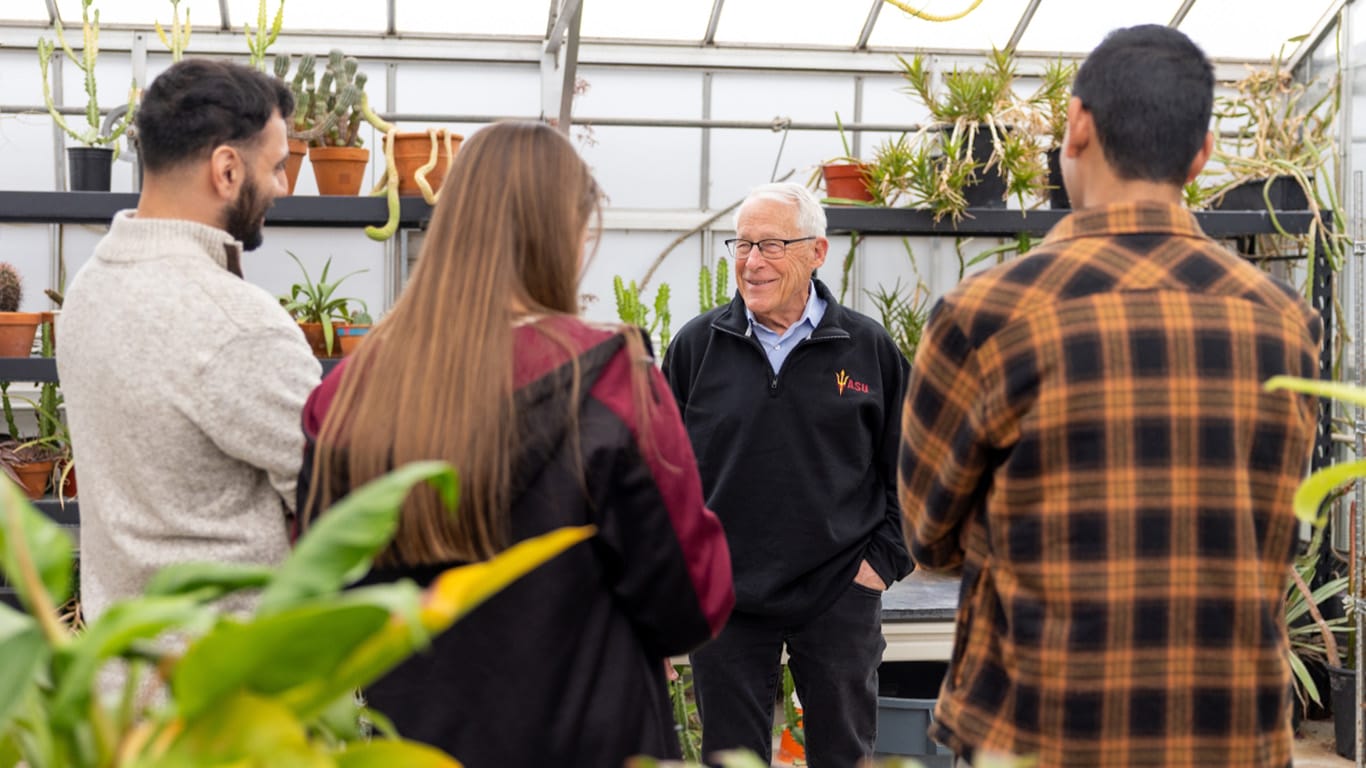When Rob Walton visited a friend in South Africa 25 years ago to tour a nature preserve, his friend told him getting involved with this kind of work was what Nelson Mandela told him “good guys” do.
The comment struck a chord with Walton, who recalled fond childhood memories of camping with his family in several of America’s national parks. Those formative experiences engaging with nature left a positive lasting impression.
LOCAL NEWS: 10 things you may not know are manufactured in Arizona
INDUSTRY INSIGHTS: Want more news like this? Get our free newsletter here
In fact, those memories influenced his decision to support his friend’s nature preserve and, in the years since, to join the board of Conservation International and support long-term partnerships and sustainability practices at Walmart.
“Conservation is important for our whole world,” said Walton, a philanthropist, conservationist and the former chairman of Walmart. “We need nature to survive. We need clean air, clean water and food that is healthy. All those things come from nature. Ultimately, I’ve made this a priority.”
Walton is a longtime supporter of Arizona State University and its ongoing commitment to sustainability. That partnership reached a new milestone today with the launch of a school dedicated to preparing the next generation of conservation leaders. Launched in New York with ASU President Michael Crow during Climate Week, the new initiative is made possible by an unprecedented $115 million philanthropic investment — the largest in the university’s history.
Funded by the Rob Walton Foundation as part of ASU’s newly launched Changing Futures campaign, the gift will establish the Rob Walton School of Conservation Futures. Additionally, in recognition of this transformational support and Walton’s dedication to planetary health, ASU’s College of Global Futures will be renamed the Rob Walton College of Global Futures.
“It is a worthy honor for all that Rob has done,” Crow said. “His long-standing support has been critically important to ASU’s leadership and growth in sustainability. He shares our institutional belief that there is an urgent need to tackle the challenges facing our planet — as well as an unbelievable opportunity to find new solutions by dedicating our time, creativity and resources to the task.”
Crow said the new school will be laser-focused on conservation, adding that “protecting the planet’s future is protecting our future, and Rob’s support is key to these efforts.”
Along with the new school, Walton’s gift will also create:
- The Rob Walton Chair to lead the Walton School of Conservation Futures.
- Three named professorships to support scholarly research, education activities and professional development.
- A scholarship fund — the Rob Walton Scholars — to provide full and partial scholarships to students.
“The Rob Walton School of Conservation Futures is redefining conservation science to address the challenges of a rapidly changing world,” said Peter Schlosser, vice president and vice provost of Global Futures. “Through its central mission of transforming conservation education for a thriving planetary future, this new academic entity is not just preserving ecosystems — it is developing adaptive solutions to ensure sustainable pathways for future generations.”
Launching in late 2025 with the Conservation Futures Academy, the school will ultimately offer training programs and certificates for high school students, working learners and corporate executives to drive conservation efforts in their communities and internationally.
The school will also offer certificates and credentials tailored for conservation organizations, government agencies and related industries, which are collectively working to conserve 30% of terrestrial and marine habitats by 2030. This worldwide initiative creates a need for specialty skill sets as well as provides an opportunity for many new jobs.
Eventually, the school will grow to include graduate and undergraduate degrees and global offerings as well as career support in conservation. Additionally, the school will partner with employers and practitioners to co-create and scale inclusive pathways into the conservation workforce.
Blending cutting-edge biodiversity research with hands-on conservation experience and diverse knowledge bases, the school aims to create well-rounded, practical solutions. It will highlight how deeply connected our world is — while also honoring the unique value of local places. It will unite traditional and nontraditional learners, employers, educators, scholars and practitioners from different perspectives. That kind of collaboration is exactly what excites Peter Seligmann, who is playing a key role in launching the school.
“Solving the planet’s greatest conservation challenges requires the wisdom, innovation and leadership of people from all corners of the world. By bringing together diverse, place-inspired solutions and perspectives, we can spark transformative action that extends far beyond any single region,” said Seligmann, chairman emeritus and former CEO of Conservation International, which he co-founded in 1987.
“The launch of this new School of Conservation Futures at Arizona State University is a vital step in growing the next generation of global leaders to create a future that ensures that nature and people thrive together.”
The new school will not only carry Walton’s name but also his philosophies and hopes for reinvigorating and safeguarding the planet.
“Conservation often starts at the local level, but to make a difference, solutions have to scale,” Walton said. “Organizations like Conservation International and African Parks have done a great job scaling successful local models to a global level. Nature doesn’t recognize borders — protecting our planet’s ecosystems for the long term requires international collaboration.”
Walton’s gift will accelerate and expand the work already in effect to partner with international, national and local NGOs, governments and business partners, as well as local and Indigenous communities, to advance conservation research and education.
“We are incredibly grateful for this transformational investment from Rob Walton and his unwavering support of ASU and planetary health,” said Gretchen Buhlig, CEO of the ASU Foundation for a New American University. “This gift will accelerate ASU’s work with global partners by enabling them to collaborate and co-design and deliver cutting-edge conservation education and training programs to ensure the next generation of conservation leaders are equipped with the skills and knowledge needed to lead in the rapidly evolving field of conservation.”
Walton is determined to see private-sector leaders join the mix to create workforces that align with the demands and opportunities of a sustainable global economy. He said the next generation of corporate leaders need to understand both how their decisions impact nature and how nature affects their businesses.
“One of the biggest gaps is leadership. We know what solutions work, and we’re seeing governments, business and funders get onboard,” Walton said. “But without enough skilled leaders to manage and scale these efforts, we won’t make the progress we need. Successful conservation requires working within cultural and political systems to achieve both local and global goals.”
Walton envisions a new school that will welcome a learner population that reflects the communities across the world, and in many cases serve a nontraditional student population. He wants the school’s initial focus to serve practitioners in the field and advanced-degree learners who are looking to pursue graduate and nondegree certificates and professional master’s degrees to enhance their career trajectories and expand conservation outcomes.
Walton has a two-decade-long relationship with ASU, in part because of Crow.
“I remember my first engagement with Michael Crow shortly after he joined us here in Arizona,” Walton said. “He spoke about three fundamental things that he believed the university must be: It must be accessible, it must represent excellence and it must be in, and of, the community.”
Walton said he wants the new school to give emerging leaders the tools, knowledge and networks to take conservation to new levels. He is saving his biggest aspirations and hopes for the students.
“Students bring fresh ideas, energy and innovation. They’re the next generation of leaders, researchers and advocates,” Walton said. “By getting involved now — through research, advocacy or fieldwork — they gain the skills to drive real change. We need their voices and commitment to sustain a healthy planet.”




